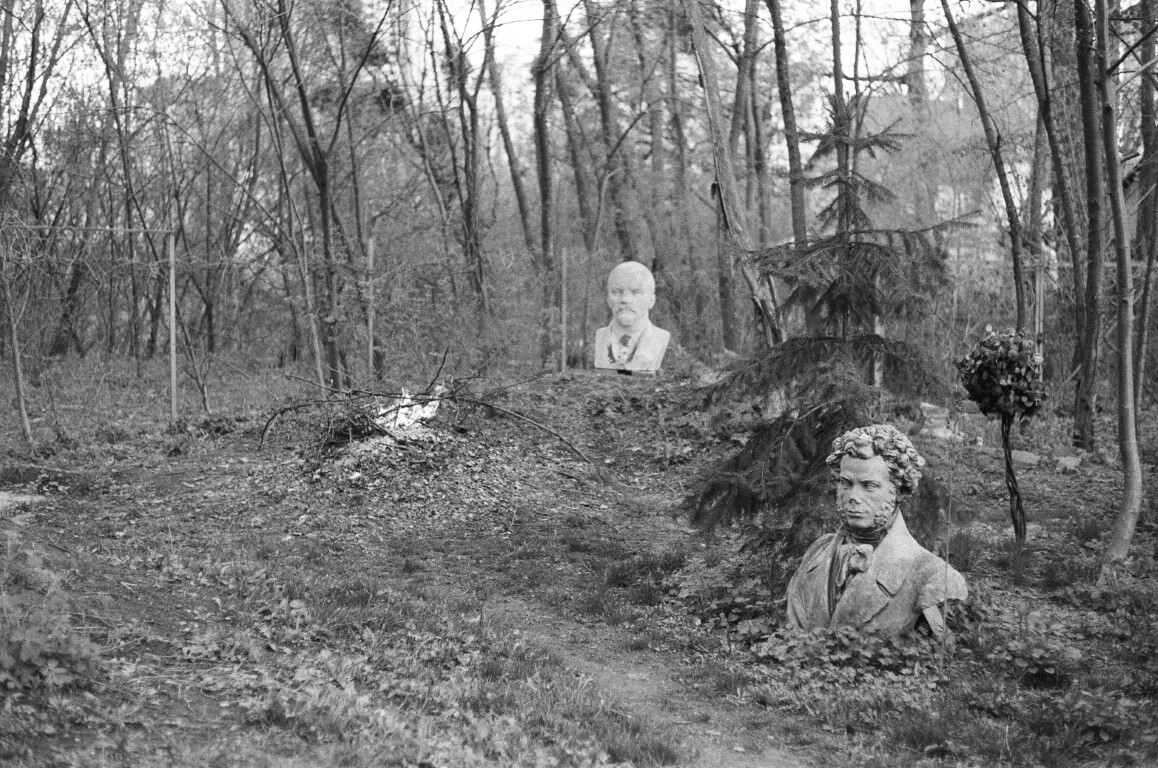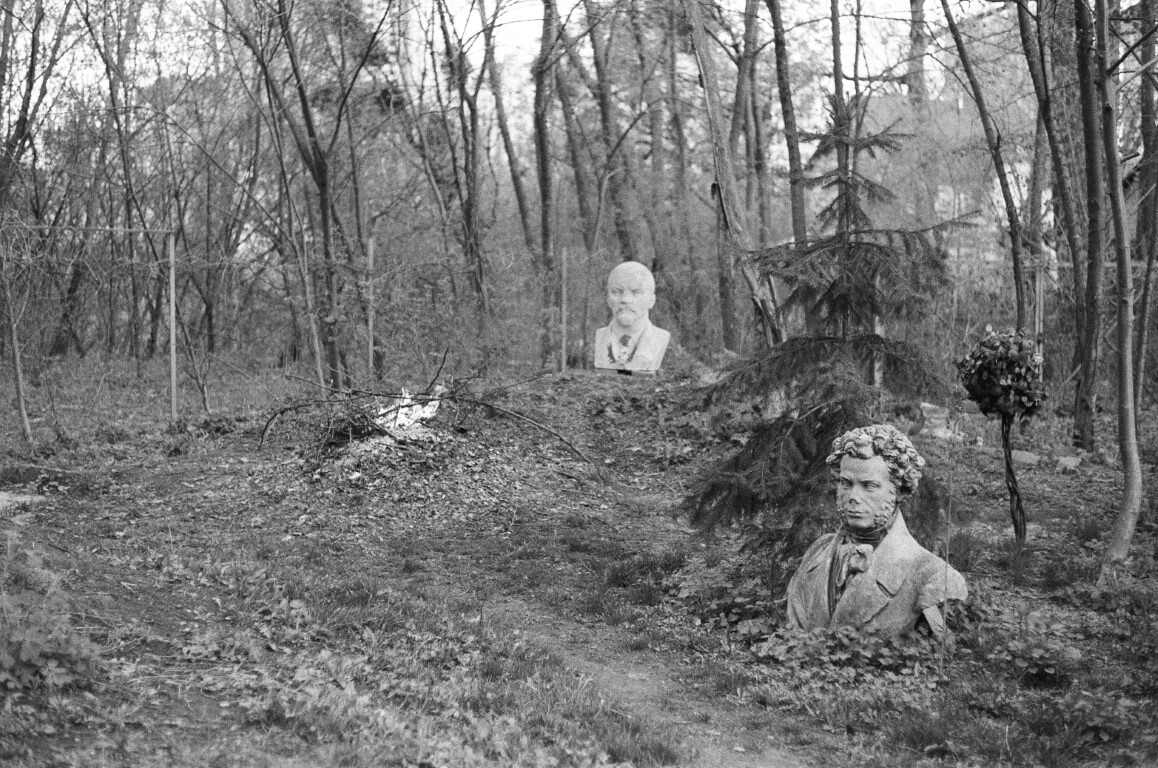

Oleksiy Radynski
The following is an excerpt from the Polish-language book Co wyrośnie z kieszeni pełnej ziaren słonecznika? (What will grow from a pocket full of sunflower seeds?), released recently by the publishing arm of the left-wing magazine Krytyka Polityczna (Political critique). Oleksiy Radynski was the editor of the Ukrainian edition of the magazine from 2011 to 2014. This conversation was recorded on May 10, 2022.
Kinga Dunin: How are things in Kyiv?
Oleksiy Radynski: We haven’t been bombed for some time now. The apocalypse, which some people anticipated on May 9, didn’t come either. There were rumors that something might happen on the occasion of so-called Victory Day—a bombing or even a nuclear attack. After all, the Russians need to show that they cannot lose this war. But it looks like they’ve got no more aces up their sleeve. Things have calmed down. People are coming back in quite high numbers, the atmosphere is very good. I think most people will return now …
KD: Not yet, I’m afraid. Are you worried that so many people have left Ukraine?
OR: I know, some of them are going to stay there: in Poland, in Europe … And perhaps it’s for the better. At least this is how they will integrate with the European Union. Since other ways have failed.
KD: You left Kyiv too when the war started.
OR: I left to help my family make it across the border. We later went to Stanyslaviv [in Ukraine] with my partner to obtain media accreditations and got back to Kyiv. These allow us to film and take photos undisturbed.
KD: Are you taking photos?
OR: I’m using an analog camera with black-and-white film to photograph everything that happens in the city, the barricades, the checkpoints, the city life. I was missing Kyiv. At first, I was simply happy to be back, I wanted to have photos as a souvenir. Since then I’ve realized that analog technology is a good choice for what is happening now.
KD: In what way?
OR: It seems to me we’ve moved way back in time. This war, which looked like it would be technologically modern, a cyberwar, has turned out to be very old-fashioned. It appears the battle of Donbas is going to be fought with tank battalions, like during World War II. Russia is something of a historical reenactor. Not only does it have a fascist and conservative ideology, but also in these terms it wants to move everyone back in time to previous eras. And such photographs go well with that for me.
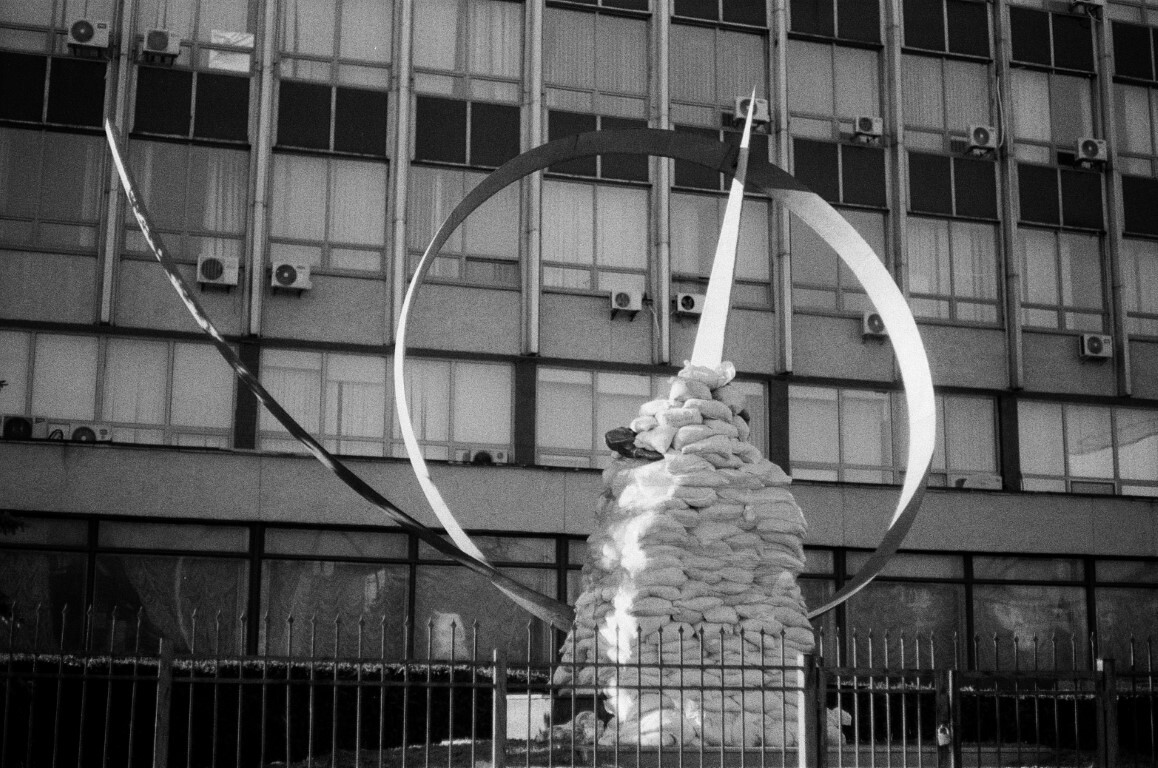

Oleksiy Radynski
KD: You’re saying you went to “Stanyslaviv,” and not “Ivano-Frankivsk”? Can you say that? Isn’t it postcolonial? Imperialistic?
OR: Half of my friends in Stanyslaviv call it “Stanyslaviv.” It’s a protest against another colonialism, another empire: the Soviet one. The figure of the Galician socialist Ivan Franko was unfortunately used in such a way during the Soviet period that nobody wants to identify with him.
Genuine decolonial struggle is not about opposing a certain specific colonialism, but all colonialisms. We realize that this colonialism, Russian imperialism, is not the only one on the planet, but for years now we have been struggling with something much worse: Russian fascism. When fascism comes, it no longer matters that the other side was not always a saint.
KD: Is there also Western imperialism?
OR: Even if there is, today we must recognize it as an absolutely progressive side, provided that it helps Ukraine wage an antifascist and anticolonial war. Of course, this cannot be said about all countries of the so-called free world.
KD: Have you got reservations about some allies?
OR: Germany.
KD: Haven’t they rehabilitated themselves?
OR: Not when they keep paying Russia for gas, which causes not only the destruction of Ukraine, but also the whole planet—no.
KD: But you realize they cannot really stop doing it right away?
OR: They shouldn’t even have started in the first place, which they knew very well even before the construction of Nord Stream. I take an interest in this project because it clearly shows that the most brutal form of corruption is “business as usual,” so-called “business beyond politics.” This is how Merkel commented on the construction of this gas pipeline. Germany, which for years admonished us, Eastern Europeans, for our corruption, has itself become utterly corrupted by Russians because it has paid off. They must have known that the ultimate goal of building Nord Stream was to annihilate Ukraine.
If you want to see what modern-day Western imperialism looks like, take a look at this alliance between Germany and Russia. At the beginning of this war, the German government was hoping we would quickly be defeated. On February 24, German ministers were telling the Ukrainian ambassador that we would capitulate in a matter of hours, and they would be talking to the occupational authorities.
KD: The blitzkrieg failed. But, after all, it’s a different situation than the war that has lasted since 2014, right?
OR: For the last eight years, it’s been absolutely clear to me every day that I’m living in a war-stricken country. I’m not saying I was expecting what happened, but it was clear that it wouldn’t all of a sudden come to an end. It was always at the back of my mind that the war would reach here and we would have to flee. But we didn’t have our backpacks packed and, ultimately, we weren’t prepared.
The most important thing for me now is that Putin has clearly stated that he wants to murder all Ukrainians like me. This means those who refuse to live in the Russian Federation. But if this is the case, they would now have to murder almost the entire Ukrainian population. Even if some support for Russia existed, they lost it after the attacks on Kharkiv, after Bucha, Mariupol. I can really feel that I’m a target of this war.
KD: Even though you grew up as a Russian-speaking Ukrainian?
OR: I grew up as a bilingual Ukrainian. I think this is one of the things that Russians still cannot comprehend at all. That mass bilingualism exists in Ukraine, as opposed to Russia, for example, where indigenous languages are simply dying out. And since Russians cannot comprehend it, they believe that the Russian language is oppressed here.
I’m still astonished at how wrong Russian intelligence reports were in this regard. They really thought that Russian-speaking citizens were supporting them. But Ukraine is an anti-Russia.
KD: In what sense?
OR: There’s no denying that Ukraine and Russia are somewhat similar. The languages are kindred, we both have the Cyrillic alphabet, we share the legacy of the Soviet Union. And yet, Russia is an authoritarian, conservative, and now also a fascist regime, whereas Ukraine is democratic. Even if its democracy is crippled, it is enough to make Russia scared.
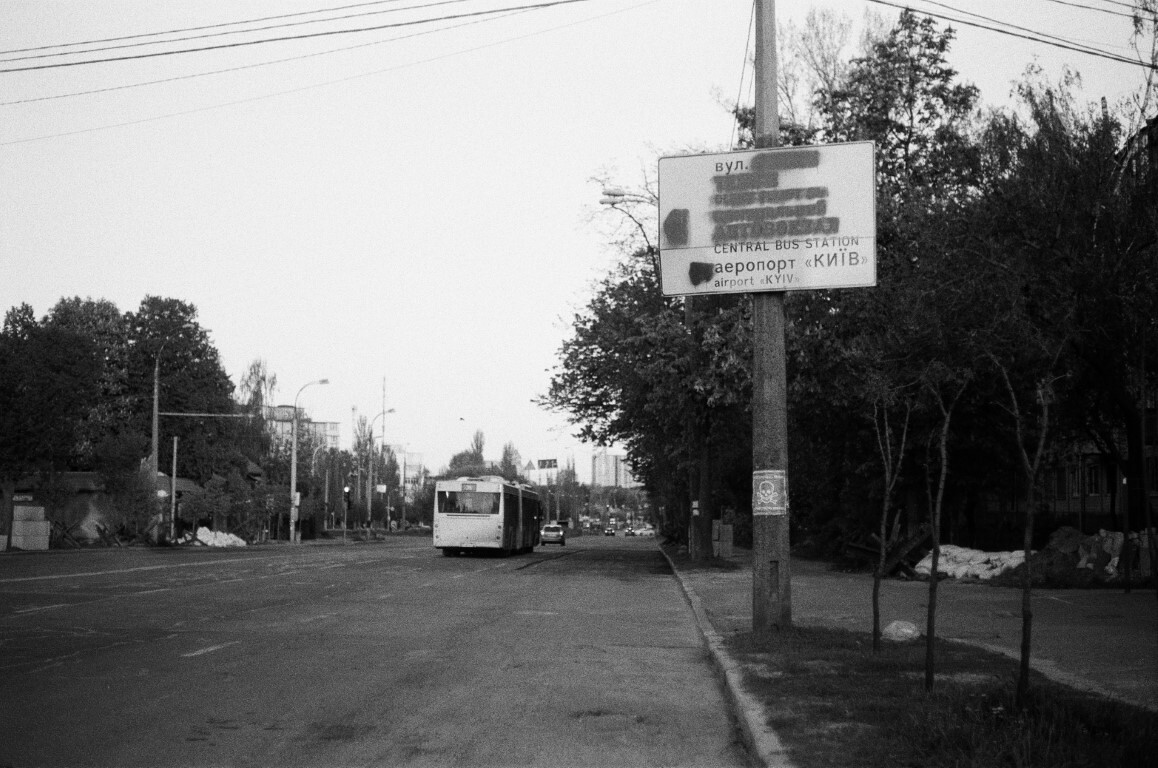

Oleksiy Radynski
KD: It’s turned out that the Ukrainian state is quite well organized, efficient, and works surprisingly well despite the war.
OR: This is not the power of the state, but of democracy. February 24 completely changed our vision of what democracy is. It was not the state that organized resistance, but the people who self-organized. Nothing in my life has brought me around more to people’s democracy. I think this is why Russia lost the battle of Kyiv, which one day, with hindsight, may turn out to have been a breakthrough moment in this war. They had a completely vertical and nondemocratic way of managing their military. The commanders of various ranks weren’t allowed to revise their action plans; they were supposed to march ahead, encircle Kyiv, and seize it. Perhaps it’s a weak argument for democracy, but as far as I know the Ukrainian army is fighting democratically, which means it’s in total disarray. It was so especially during the first weeks, when the territorial defense forces were forming and an incredible number of people wanted to join. This story is yet to be written, it was … Makhnovshchyna.1 A kind of people’s army. There was something Cossack about it.
KD: Nestor Makhno was…
OR: … the leader of the anarchist army that fought in southern Ukraine, in the Huliaipole area, during the civil war a century ago. Historians believe that it was the first anarchist formation in history. Serhiy Zhadan once wrote a beautiful book about it, Anarchy in the UKR, which was translated into many languages. At the moment, the Russian army is trying to besiege Huliaipole.
KD: But won’t this anti-Russia have to unlearn Russian?
OR: Of course not. Russian is our language and we won’t give it away to Putin. But we can call it the Eastern Ukrainian language. There is also a Southern Ukrainian language. Even if we are anti-Russia, there is an element of Russia in us. We are the only country where free speech in Russian exists for the time being. One of the things I was happy to see in Kyiv after we came back was that people had not stopped speaking Russian. Despite the siege by the Russian army and although so many people died. I wouldn’t have been surprised if they no longer wanted to speak this language.
We will not give this language away to Russians and Putin because they don’t know how to use it. What they use is some kind of newspeak, a necro-language. They cannot even use the word “war.” The fascist dictatorship blocks the development of culture. Russia, the Russian Federation, whatever will be left of it, will not hold a monopoly on Russian language and culture. The end of the war, which Russia will lose, I hope, will be followed by a dark time when culture will not develop there, aside from the underground.
I think we should appropriate this language and develop a Russian-speaking culture in Ukraine on top of the Ukrainian-speaking culture. And culture in the Eastern Ukrainian language.
Although nowadays I more often think about the culture of nations that remain under Russian authority.
KD: So Russian culture should not be boycotted?
OR: This would be too big a favor to Russian imperial culture. Russian culture deserves a punishment much more severe than a boycott. It deserves a deconstruction. I think this is our mission, my mission, because I don’t know how to shoot, and even if I knew, there are already too many volunteers. Why wasn’t there a reckoning with the imperial tradition after the collapse of the Soviet Union? Why did fascism grow out of it? In order to deconstruct it, we need to get to know this culture.
Boycott is obviously a must at the institutional level. In my field, everything is more or less clear. As for all these competitions, festivals, screenings abroad, these are films made with state funding in Russia and they should be boycotted. As for independent artists, these are already individual questions. We can allow for a more flexible approach.
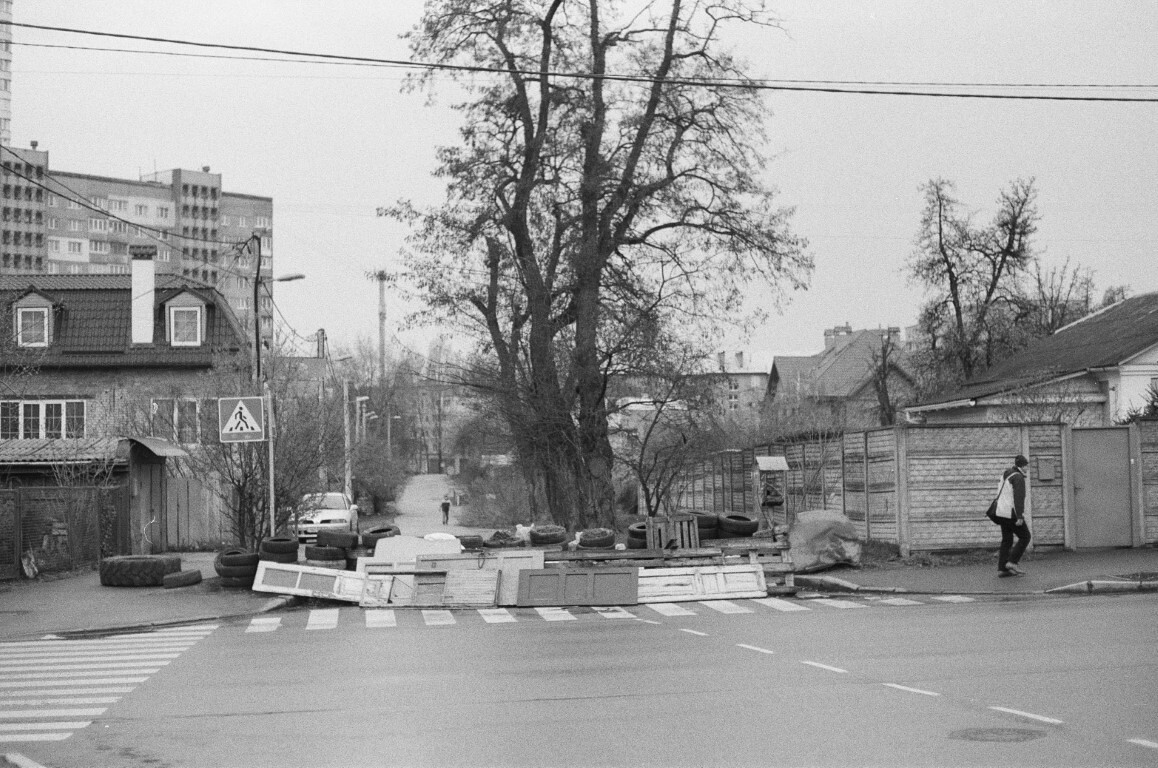

Oleksiy Radynski
KD: So you read Russian writers?
OR: I can perfectly understand people in Ukraine who no longer want to read any book by a Russian writer ever in their lives. I don’t grant myself such a privilege because I believe you’ve got to know your enemy very well. Especially if that enemy is best described precisely by old Russian literature. Those who were able to think and write developed a discourse that overthrew czarist Russia.
I’m now most interested in nineteenth-century Russian literature. I believe these are our greatest allies. The most radical critics of Russia and everything we hate about it were Russian writers and intellectuals. And it is they who contributed to the collapse of czarist Russia. According to Lenin, Tolstoy was the mirror of the Russian Revolution. Today, if you take to the streets with a quote from his book, you will be arrested.
This deconstruction should also reshuffle various hierarchies in this pantheon. Now that I’ve found a bit of time, aside from [Taras] Shevchenko’s [poetry collection] Kobzar, I’ve also read [the novella] Hadji Murat by Tolstoy. The war crimes he described are exactly the same as those currently perpetrated by Russians in Ukraine, in Bucha. It offers a very interesting, comprehensive critique of the Russian state. But then I started reading his autobiography and I saw that he was simply a so-called “good Russian” (this is what people in Ukraine now call Russians who criticize Putin but fail to grasp their own complicity in his crimes). All his life he had serfs, or peasants subjugated to him in other ways, whom he wanted to take care of. And this is his perspective. I think an incomparably better writer was Nikolai Leskov, who did not write from the position of a good feudal master, but from the perspective of the oppressed people and the provinces. He was a regionalist, so to speak; he lived in many places and in his writings I found the most fascinating things about Kyiv I’d ever read in my life. I find his novels about Yakutia, Siberia very interesting.
Deconstructing Russian culture means challenging the existing pantheon, now headed by “Tolstoyevski”—Tolstoy, the “good Russian,” and the mad right-winger Dostoevsky. And not by, let’s say, truly radical writers, such as Leskov. After the deconstruction of this culture, we will also look in a completely different way at Ukrainian literature, for example at such a decolonial revolutionary as Taras Shevchenko.
KD: Do you see any contemporary critical Russian voices? I know you like Sorokin.
OR: Yes, he’s thinking about overthrowing this regime. Sorokin is nowadays seen as a prophet in Russia thanks to his book Day of the Oprichnik, because Putin’s second reign proved it right. But his extensive futuristic novel Telluria is more interesting.
KD: It hasn’t been translated into Polish.
OR: It’s a great shame. Perhaps Krytyka Polityczna can fill this gap? It’s about a Russia that has disintegrated into people’s republics, which are waging a total civil war with each other. It was published in 2013. A year later, those pseudo-republics in Donetsk and Luhansk were conceived. And if such pseudo-republics already exist in Ukraine, there is no reason why they couldn’t exist in other former parts of the empire. Russia started this suicidal war because it realized it could not exist on such a scale, as an imperial state, without holding possession of Ukraine.
KD: But why is that?
OR: If something is possible here, why can’t it be possible there? Why not in republics that form part of the Federation? Republics like Tatarstan and Yakutia were already almost independent in the 1990s. If Russia cannot keep hold of Ukraine—seen in Russian mythology as a similar, brotherly country, the cradle of Russian statehood—can they keep control of other decentralizing movements?
I don’t want to evaluate the potential of these republics now, twenty years after their autonomy and the federalist principle were dismantled. This will not necessarily proceed in the same way as the collapse of the Soviet Union. It will be different. It will not proceed on the basis of ethnic self-determination.
The Russian underground is currently engaged in debates on Telegram about the idea of a “national divorce,” mainly advocated by regionalists from the north, from the area of Petersburg, Pskov … these are not ethnic identities, but identities within the Russian nation. Moscow is seen as a vampire that has sucked everything out of the other regions and has now thrown them down the drain. I’m not following authors of Russian literature now as much as I’m following the blogosphere.
I take a particular interest in regionalist movements, activists of ethnic groups. There are a lot of channels like this, obviously anonymous. They hold huge intellectual potential.
KD: Can we therefore speak about a Russian civil war?
OR: It’s been going on for years, but in various forms. At the foundation of the Russian Federation lay the all-out civil war of October 1993. This internal conflict has been swept under the carpet, but they keep exporting it.
KD: So when are we going to see the end of the Russian Federation?
OR: I cannot give you a precise date and it is surely not going to happen at a specific moment. But I think that at some point in the future historians will recognize February 24, 2022 as the beginning of the end of the Russian Federation. Not because the heroic Ukrainian army will reach Moscow and seize it, but because the decentralization processes will gain momentum. Sooner or later something will happen to Putin and everything will fall apart. The end of Putin will mark the end of Russia as we know it. First, there will be a top-down disintegration of the Federation, just like in the Soviet Union, and this will accelerate grassroots processes inside the empire.
Translated from the Polish by Łukasz Mojsak.
“The Makhnovshchina (Ukrainian: Махновщина, romanized: Makhnovshchyna) was an attempt to form a stateless anarchist society in parts of Ukraine during the Russian Revolution of 1917–1923. It existed from 1918 to 1921, during which time free soviets and libertarian communes operated under the protection of Nestor Makhno’s Revolutionary Insurgent Army.” Wikipedia →.
